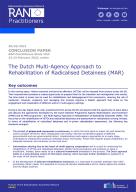Details
- Publication date
- 19 January 2024
- Author
- Directorate-General for Migration and Home Affairs
- RAN Publications Topic
- Rehabilitation
Description
In the coming years, violent extremist and terrorist offenders (VETOs) will be released from prisons across the EU. Their imprisonment presents a unique opportunity to prepare them for the transition and reintegration into society. The time spent in prison can be sued for rehabilitation and disengagement from extremism, reducing the risk of recidivism. However, preparing and managing this process requires a holistic approach that relies on the engagement and cooperation of different actors in multi-agency settings.
During a two-day digital study visit, practitioners from across the EU and beyond had the opportunity to learn about and discuss the approaches developed by the Dutch National Programme Against Radicalisation and Extremism (PARE) and its MAR programme - the Multi-Agency Approach to Rehabilitation of Radicalised Detainees (MAR). The focus was on the rehabilitation of VETOs and radicalised detainees and assessment for radicalisation among inmates. In terms of rehabilitation of radicalised detainees and in-prison radicalisation assessment, the following key elements emerged:
- The process of prison-exit represents a continuum, in which the time spent in prison can and should be used to prepare VETOs for their reintegration into society with the coordinated support of different governmental and non-governmental actors. Implementing multi-agency approaches at an early stage contributes to creating this continuum between prison and society. Prison-exit requires proper preparation, an adequate handover and continuity on the local level.
- Information sharing lies at the heart of multi-agency cooperation and is crucial for enhancing the rehabilitation of VETOs and radicalised detainees. Merely having procedures and protocols in place is insufficient. Instead, there needs to be a cultural framework embedded in the process. The Dutch approach builds on a long-standing culture of information sharing, which has been further facilitated by legislation in the wake of the Utrecht attack.
- In the development of tailored rehabilitation measures, it is important to consider potential risks while prioritising clients’ needs. It is essential to involve all relevant stakeholders and to clearly define the content and the target audience.
- Ownership of the rehabilitation process is crucial. This means the offender should be actively involved in the rehabilitation plan to avoid reinforcing feelings of rejection that they may be already experiencing. Additionally, other stakeholders, such as the municipality, probation and police, should also be included in the rehabilitation process.
- Conducting in-prison assessment of radicalisation and the required structures, including training for prison staff, are critical to implement the rehabilitation process effectively.

